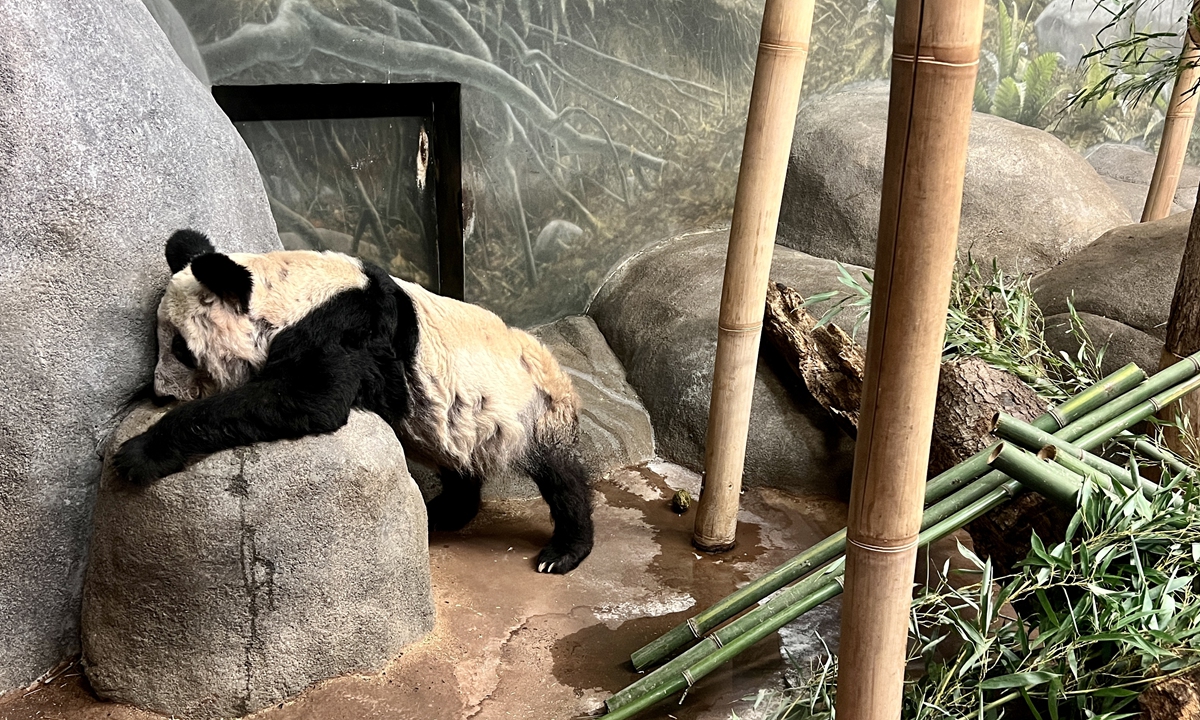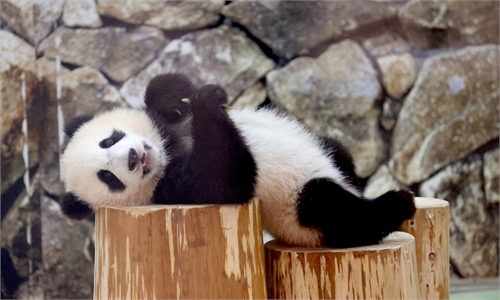We are not willing to believe that anyone would abuse giant pandas: Global Times editorial

Giant panda Ya Ya is at the the Memphis Zoo in the US on February 14. Photo: IC
According to a Wednesday notice released by the China Association of Zoological Gardens, the Beijing Zoo will send staff including veterinarians and keepers to the US next week. They will coordinate with the Memphis Zoo to take care of and bring back the giant panda Ya Ya to China. This news immediately became a trending topic and has comforted those who are concerned with Ya Ya's health. Perhaps only after Ya Ya returns to China can this unexpected episode that is occurring against the backdrop of strained US-China relations come to an end, but the underlying issues it reflects, and the potential harm it will cause to the emotions of the Chinese and American peoples, are worthy of further reflection and discussion.Ya Ya, a female panda, was born in the Beijing Zoo in August 2000. In April 2003, as part of a cooperation program on the protection and research of giant pandas between China and the US, Ya Ya and Le Le, a male panda from the Shanghai Zoo, flew to Memphis. Since the beginning of 2021, there have been continuous reports about poor health and conditions of Ya Ya and Le Le, with heart-wrenching photos. In February this year, Le Le unfortunately died, and pictures of the emaciated Ya Ya also have had a strong impact on the Chinese public.
To be honest, it's hard not to question the care and management of the Memphis Zoo in this situation. It should be noted that this could have been resolved through timely, patient, and professional responses from the Memphis Zoo. However, compared to the overwhelming public opinion, the Memphis Zoo has not effectively responded to the concerns. This does not give the impression that it values and cherishes giant pandas, and it also lacks sufficient awareness of the moods of the Chinese public.
If this had not happened during a period when Washington is intensifying its containment and suppression of China, this matter would not have caused such a stir. Whether it's a corn-milling plant, a crane, or an unidentified flying object, anything with a "China" tag could be seen as a "threat" by the US. As China's national treasure and a "friendly messenger" symbolizing friendship of the Chinese people, could giant pandas become victims of the "hysterical neo-McCarthyism?" Such associations and concerns are not unwarranted, and some Chinese people's vehement emotions can also be understood.
If coincidences happen frequently, they no longer are coincidences. During the period when concerns were gradually raised over the poor conditions of Ya Ya and Le Le, The New York Times published an article in February of last year questioning the value of China-US "panda diplomacy," calling giant pandas a propaganda "window dressing" for China's diplomacy with the US "softening the country's authoritarian image and drawing attention away from its record of human rights abuses." A congressman even proposed a bill on the matter.
However, we are still not willing to believe that the Memphis Zoo would intentionally abuse giant pandas. We believe in the basic goodness and rationality of the American people. Even though perverts who are so fiercely anti-China and would harm these lovable creatures do exist in the US, they should be the exception rather than the norm.
We have noticed that the Memphis Zoo made a lot of efforts to take care of the giant pandas. The proposed bill that targets Panda diplomacy by the lawmaker was criticized in the US and ended with nothing. As for whether the Memphis Zoo and local institutions are negligent in the care of Ya Ya and Le Le, a joint investigation by both China and the US is necessary to draw conclusions.
Giant pandas are loved by people all over the world. The current look of Ya Ya not only breaks the hearts of the Chinese people. We hope that its health condition can improve after returning to China. When even giant pandas are affected and implicated, it indicates that the China-US relations are already quite bad. This is a strong warning signal. It shows that the hostile posture of some Washington elites toward China has already affected the normal and friendly interactions between the two peoples. The various controversies over the situation of Ya Ya also indicate how important communication is in resolving differences. In this sense, we urge the Memphis Zoo to respond more sincerely, and we hope the US can learn more about ways of communication from this.
In recent years, some people in the US often mention the "Chinese people," but in reality, it's not difficult to make a judgment on their responses to the concerns of the Chinese people and how they repeatedly damage the interests of the Chinese people. If they truly respect and care about the feelings of the Chinese people, they need to take more practical actions to make up for their mistakes.


